
With significant voter turnout and a diverse candidate pool, this election marks a critical juncture in the region’s political evolution.
In an interview with Tarique Anwar, Amarjit Singh Dulat (AS Dulat), former special director of the Intelligence Bureau, ex-secretary of the Research and Analysis Wing (R&AW) and a well-known expert on Kashmir, shares his perspective on the region’s intricate geopolitical landscape.
What is Kashmir, according to you?
Kashmir is a difficult geopolitical region, which is complex and difficult to understand. It can be won with love and warmth. It is witnessing a momentous election. It is a welcome development that it is recording such a high percentage of voters turnout.
This is the first election after the abrogation of Article 370. Your views?
There have been some positive developments —which the government points out—like stone pelting and hartals (strikes) have stopped. It has stopped because of the initial muscular policy we have adopted. Following the abrogation of Article 370, a huge revolt was anticipated but that did not happen. Kashmiris decided not to come out and unnecessarily get killed. So, the muscular policy worked.
I differentiate between militancy and terrorism like this – in militancy, our own boys, the Kashmiri youth, are involved. It first started in South Kashmir, which was the most vulnerable. But the most difficult part of Kashmir actually is the North because that’s where infiltration takes place. Worst terror attacks have been carried out in the North. It gradually came to Srinagar. Now, these are largely over. But we still have to deal with terror sponsored by Pakistan.
هذه القصة مأخوذة من طبعة October 11, 2024 من Outlook.
ابدأ النسخة التجريبية المجانية من Magzter GOLD لمدة 7 أيام للوصول إلى آلاف القصص المتميزة المنسقة وأكثر من 9,000 مجلة وصحيفة.
بالفعل مشترك ? تسجيل الدخول
هذه القصة مأخوذة من طبعة October 11, 2024 من Outlook.
ابدأ النسخة التجريبية المجانية من Magzter GOLD لمدة 7 أيام للوصول إلى آلاف القصص المتميزة المنسقة وأكثر من 9,000 مجلة وصحيفة.
بالفعل مشترك? تسجيل الدخول
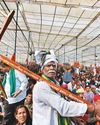
Protest 2.0
Farmers still have hopes from their leaders, but time is running out. The enemies, in the meanwhile, are sharpening their weapons

Time for Course Correction
What the protest by Punjab's landed peasantry tells us about the state's economy and society
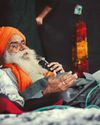
The Farmer-Composing Antagonist
Farmer leader Jagjit Singh Dallewal has been on a fast-unto-death at Khanauri border to pressurise the government to fulfil its promises to the farming community
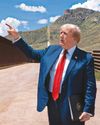
Nomadland
All eyes are on President-elect Donald Trump and his policy on immigration

Far from Home
We have forgotten the plight of Afghans who fled to India, and continue to suffer
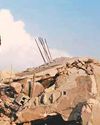
Bang Bang That Awful Sound
What happens when we listen closely to the soundscape of war?

Refugee Dilemma
For most Indian-origin Sri Lankan Tamils, who are victims of ethnic conflict and civil war, proving that they are not illegal migrants is a nearly impossible task

They Poured Fire on Us
The resilience of refugee women from Sudan, Ethiopia and Yemen in the face of war and displacement is remarkable
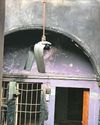
The Sound and the Fury
Iraqi poet, novelist, translator and scholar Sinan Antoon was born and raised in Baghdad.

The Day I Became a Woman
In a country where authorities have been directly engaging in the gruesome war against women for decades, artists like Nahid Hassanzadeh stand apart as a voice of dissent–a haunting reminder of the unwavering spirit of the rebellious Iranian women fighting against the Islamic Republic’s violent crackdown.